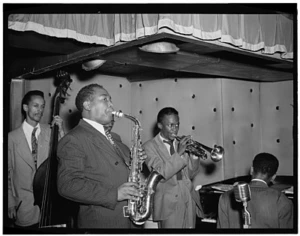Biography
(No Information)
Filmography
all 1
Movies 1
Original Music Composer

Dangerous Love Affairs (1959)
Movie
Information
Known ForSound
GenderMale
Birthday1922-04-01
Deathday2006-08-08 (84 years old)
Birth NameIrving Sidney Jordan
Birth PlaceNew York City, United States
CitizenshipsUnited States of America
This article uses material from Wikipedia.
Last updated:
 Duke Jordan
Duke Jordan- Filmography
- Information